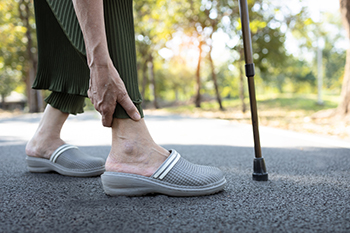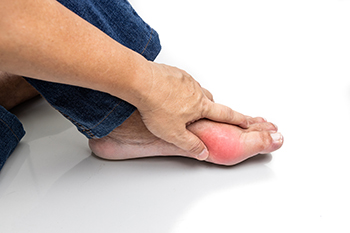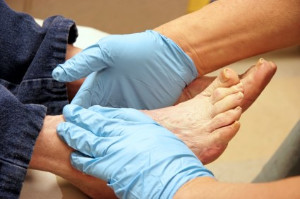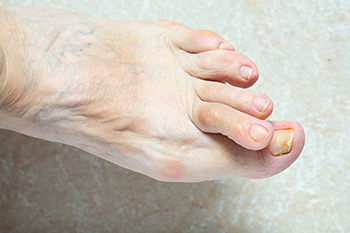November 2023
Ankle Pain in the Elderly

Ankle pain in seniors can significantly affect mobility and quality of life. It often results from wear and tear on the ankle joint, leading to conditions such as osteoarthritis, where the cartilage cushioning the bones wears down. Another common cause is rheumatoid arthritis, an autoimmune condition that can cause joint pain and swelling. Ankle pain may also stem from past injuries, such as sprains or fractures that did not heal properly, or from changes in gait and balance as one ages. Poor circulation, gout, and nerve damage including peripheral neuropathy can contribute as well. It is important for seniors experiencing ankle pain to consult a podiatrist who can diagnose the cause accurately. Treatment may include medication for pain and inflammation, or wearing supportive braces or footwear. In some cases, if conservative treatments are not effective, surgical options may be considered. If you are a senior and experiencing ankle pain, it is suggested that you make an appointment with a podiatrist for an accurate diagnosis and treatment options.
Ankle pain can be caused by a number of problems and may be potentially serious. If you have ankle pain, consult with the podiatrists from New England Family Foot Care. Our doctors will assess your condition and provide you with quality foot and ankle treatment.
Ankle pain is any condition that causes pain in the ankle. Due to the fact that the ankle consists of tendons, muscles, bones, and ligaments, ankle pain can come from a number of different conditions.
Causes
The most common causes of ankle pain include:
- Types of arthritis (rheumatoid, osteoarthritis, and gout)
- Ankle sprains
- Broken ankles
- Achilles tendonitis
- Achilles tendon rupture
- Stress fractures
- Bursitis
- Tarsal tunnel syndrome
- Plantar fasciitis
Symptoms
Symptoms of ankle injury vary based upon the condition. Pain may include general pain and discomfort, swelling, aching, redness, bruising, burning or stabbing sensations, and/or loss of sensation.
Diagnosis
Due to the wide variety of potential causes of ankle pain, podiatrists will utilize a number of different methods to properly diagnose ankle pain. This can include asking for personal and family medical histories and of any recent injuries. Further diagnosis may include sensation tests, a physical examination, and potentially x-rays or other imaging tests.
Treatment
Just as the range of causes varies widely, so do treatments. Some more common treatments are rest, ice packs, keeping pressure off the foot, orthotics and braces, medication for inflammation and pain, and surgery.
If you have any questions, please feel free to contact our office located in Milton, MA . We offer the newest diagnostic and treatment technologies for all your foot care needs.
Understanding How to Live With Gout

Gout, a form of arthritis, paints a distinctive portrait of discomfort that individuals must learn to decipher. Recognizing the signs is pivotal, and sudden, intense joint pain, often in the big toe, signifies the onset. Swelling and redness can accompany these flares, underscoring the need for early identification. The causes of gout reside in an excess of uric acid, leading to the formation of sharp crystals in the joints. Factors such as diet, genetics, and underlying health conditions contribute to the heightened uric acid levels. Living with gout necessitates a multidimensional approach. Adopting a gout-friendly diet, staying hydrated, and managing weight are fundamental steps. Navigating life with gout demands an understanding of one's body and a commitment to a holistic lifestyle that fosters joint health and overall well-being. If you are afflicted with gout, it is strongly suggested that you are under the care of a podiatrist who can help you to manage this condition.
Gout is a painful condition that can be treated. If you are seeking treatment, contact the podiatrists from New England Family Foot Care. Our doctors will treat your foot and ankle needs.
What Is Gout?
Gout is a form of arthritis that is characterized by sudden, severe attacks of pain, redness, and tenderness in the joints. The condition usually affects the joint at the base of the big toe. A gout attack can occur at any random time, such as the middle of the night while you are asleep.
Symptoms
- Intense Joint Pain - Usually around the large joint of your big toe, and it most severe within the first four to twelve hours
- Lingering Discomfort - Joint discomfort may last from a few days to a few weeks
- Inflammation and Redness -Affected joints may become swollen, tender, warm and red
- Limited Range of Motion - May experience a decrease in joint mobility
Risk Factors
- Genetics - If family members have gout, you’re more likely to have it
- Medications - Diuretic medications can raise uric acid levels
- Gender/Age - Gout is more common in men until the age of 60. It is believed that estrogen protects women until that point
- Diet - Eating red meat and shellfish increases your risk
- Alcohol - Having more than two alcoholic drinks per day increases your risk
- Obesity - Obese people are at a higher risk for gout
Prior to visiting your podiatrist to receive treatment for gout, there are a few things you should do beforehand. If you have gout you should write down your symptoms--including when they started and how often you experience them, important medical information you may have, and any questions you may have. Writing down these three things will help your podiatrist in assessing your specific situation so that he or she may provide the best route of treatment for you.
If you have any questions, please feel free to contact our office located in Milton, MA . We offer the newest diagnostic and treatment technologies for all your foot care needs.
Recognizing Diabetic Symptoms in the Feet

Diabetes is a condition that affects multiple aspects of your health, including your feet. Individuals living with diabetes need to be vigilant about potential foot-related symptoms, as they are at higher risk of developing complications. One common symptom is peripheral neuropathy, which can manifest as tingling, burning, or numbness in the feet. This occurs when high blood sugar damages the nerves, impairing sensation. Reduced blood flow to the feet is another issue, leading to cold or discolored skin and slower wound healing. Diabetes can also cause changes in the foot's shape, such as Charcot foot, where the arch collapses. This may lead to deformities and instability. Additionally, diabetic individuals are more prone to foot ulcers and infections. It is important to pay close attention to these symptoms, as early detection and proper management are key to preventing severe complications. If you have diabetes, it is strongly suggested that you are under the care of a podiatrist who can help you to manage this condition.
Diabetic foot care is important in preventing foot ailments such as ulcers. If you are suffering from diabetes or have any other concerns about your feet, contact the podiatrists from New England Family Foot Care. Our doctors can provide the care you need to keep you pain-free and on your feet.
Diabetic Foot Care
Diabetes affects millions of people every year. The condition can damage blood vessels in many parts of the body, especially the feet. Because of this, taking care of your feet is essential if you have diabetes, and having a podiatrist help monitor your foot health is highly recommended.
The Importance of Caring for Your Feet
- Routinely inspect your feet for bruises or sores.
- Wear socks that fit your feet comfortably.
- Wear comfortable shoes that provide adequate support.
Patients with diabetes should have their doctor monitor their blood levels, as blood sugar levels play such a huge role in diabetic care. Monitoring these levels on a regular basis is highly advised.
It is always best to inform your healthcare professional of any concerns you may have regarding your feet, especially for diabetic patients. Early treatment and routine foot examinations are keys to maintaining proper health, especially because severe complications can arise if proper treatment is not applied.
If you have any questions please feel free to contact our office located in Milton, MA . We offer the newest diagnostic and treatment technologies for all your foot and ankle needs.
Treatment for Overlapping Toes

Overlapping toes, also known as toe overlap or crossover toe, can be a painful and annoying condition. It occurs when one toe sits on top of another, making it difficult to wear shoes and, in some cases, inhibiting mobility. Toe overlap can be the result of genetics, wearing tight-fitting shoes, and muscle imbalances. It can also be associated with other conditions, such as bunions or hammertoes. When dealing with toes that overlap, several treatment options are available. Manual separation, involving the taping of toes into a straight position, can be effective for both children and adults when initiated early. Orthotic footwear, including specialized shoes and custom insoles, can help to alleviate pressure and promote proper toe alignment. Muscle imbalances and joint misalignment can be addressed through targeted exercises. In severe cases, or with the presence of large bunions, surgical intervention may be necessary to correct overlapping toes and their associated issues. If you are suffering the effects of toes that overlap, it is suggested that you make an appointment with a podiatrist who can conduct a thorough examination in order to determine the most suitable treatment plan for you.
Toe pain can disrupt your daily activities. If you have any concerns, contact the podiatrists of New England Family Foot Care. Our doctors can provide the care you need to keep you pain-free and on your feet.
What Causes Toe Pain?
Most severe toe pain is caused due to a sports injury, trauma from dropping something heavy on the toe, or bumping into something rigid. Other problems can develop over time for various reasons.
Toe pain can be caused by one or more ailments. The most common include:
- Trauma
- Sports injury
- Wearing shoes that are too tight
- Arthritis
- Gout
- Corns and calluses
- Hammertoe
- Bunions
- Blisters
- Ingrown toenails
- Sprains
- Fractures (broken bones)
- Dislocations
When to See a Podiatrist
- Severe pain
- Persistent pain that lasts more than a week
- Signs of infection
- Continued swelling
- Pain that prevents walking
Diagnosis
In many cases the cause of toe pain is obvious, but in others, a podiatrist may want to use more advanced methods to determine the problem. These can range from simple visual inspections and sensation tests to X-rays and MRI scans. Prior medical history, family medical history, and any recent physical traumatic events will all be taken into consideration for a proper diagnosis.
Treatment
Treatments for toe pain and injuries vary and may include shoe inserts, padding, taping, medicines, injections, and in some cases, surgery. If you believe that you have broken a toe, please see a podiatrist as soon as possible.
If you have any questions please feel free to contact our office located in Milton, MA . We offer the newest diagnostic tools and technology to treat your foot and ankle needs.









